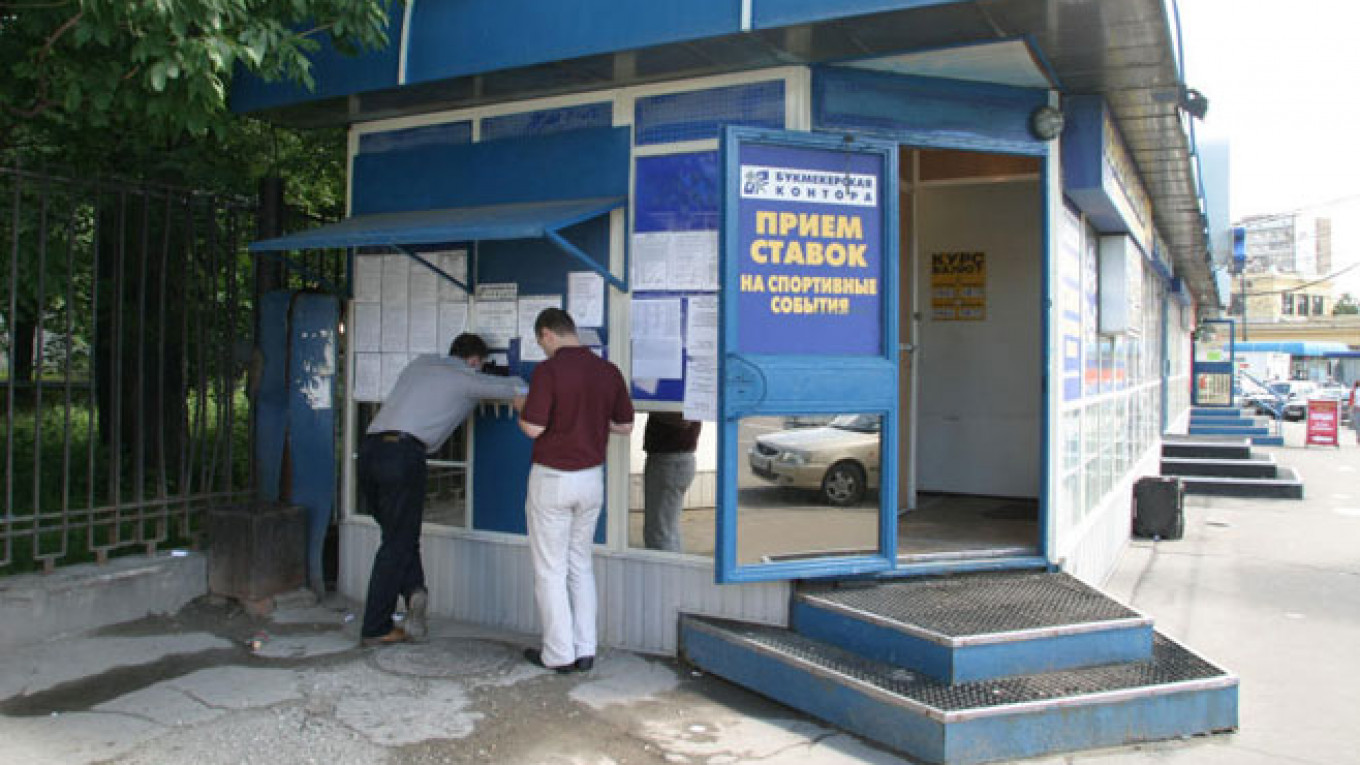A $50,000-punt on your favorite player becoming the top scorer at the football World Cup in Brazil or a wager on the probability that Uruguay's Luis Suarez will sink his teeth into an opponent again may seem odd, but these are real bets in an industry where mathematics supplements sheer luck.
Russians may not be quite so foolhardy or inventive in their bets, but the World Cup is seriously stoking their interest, with up to 50 percent more people betting on football than before the tournament kicked off, Oleg Zhuravsky, president of the Russian Bookmakers Union, said Wednesday.
The World Cup has been packed full of surprises so far, with a number of the pre-tournament favorites being knocked out by outsiders, wiping conventional bets off the table and rewarding bold punters with hefty payouts.
Who would have thought that Robin van Persie's beautiful diving header that leveled the score between the Netherlands and Spain would open the floodgates for a 5-1 rout of the former world champions? Or that Italy and England would have to fly home even before the knockout stages get under way?
The unexpected successes and failures of teams in Brazil have directly affected the bets that thousands of people are making worldwide.
"One punter bet 50 euros [$68] that Costa Rica will win the tournament at odds of 2,500/1 and that bet is looking a lot less like a long shot now than it did at the start of the tournament," said Joe Crilly, a spokesman for William Hill, Britain's biggest bookmaker.
He also said that when the favorites are eliminated, it is always good news for the bookmakers due to the liabilities that are racked up in the buildup to the tournament.
"But we always say that it is best for us if some of these fancied sides get further in the tournament and then fall at the penultimate of final hurdle," Crilly said.
Zhuravsky said that profits gleaned as a result of favorites exiting the tournament early may be high in the short run, but that in the end the margin levels out.
"The task of a bookmaker is to make a 5 to 10 percent profit on the invested funds regardless of which teams win," he said.
The bookmaking industry in Russia is still relatively young but is already getting close to Western proportions in terms of the amount of money people are prepared to bet. The average bet in Russia on sporting events in general is about 800 rubles ($23), while the average bet on the World Cup in Britain, by comparison, is less than £12 ($20).
Zhuravsky estimated that the Russian bookmakers' turnover has increased from $400 million to $2 billion in the last five years.
He did not associate this growth with a ban on casino gambling that was introduced in Russia in 2009.
Betting on sport is different from pulling the lever of a one-armed bandit, Zhuravsky said, in that punters should have a good knowledge of the sport and as well as good analytical skills.
"It is a different approach to the way we spend leisure time that has developed recently. You not only watch a good game on the dozens of channels that are now available, but you can also profit from putting your own brain to good use," Zhuravsky said.
He linked the growing popularity of bookmakers to the government's support of sports in general.
"The interest to sport is high at all levels of the government," Zhuravsky said. "We were all anxious before the Olympics and are now looking forward to the 2018 football World Cup," which will be hosted in Russia. "This is what is driving the bookmakers' business," he added.
See also:
Crimea Seeks to Become Next Las Vegas
Contact the author at [email protected]
A Message from The Moscow Times:
Dear readers,
We are facing unprecedented challenges. Russia's Prosecutor General's Office has designated The Moscow Times as an "undesirable" organization, criminalizing our work and putting our staff at risk of prosecution. This follows our earlier unjust labeling as a "foreign agent."
These actions are direct attempts to silence independent journalism in Russia. The authorities claim our work "discredits the decisions of the Russian leadership." We see things differently: we strive to provide accurate, unbiased reporting on Russia.
We, the journalists of The Moscow Times, refuse to be silenced. But to continue our work, we need your help.
Your support, no matter how small, makes a world of difference. If you can, please support us monthly starting from just $2. It's quick to set up, and every contribution makes a significant impact.
By supporting The Moscow Times, you're defending open, independent journalism in the face of repression. Thank you for standing with us.
Remind me later.






